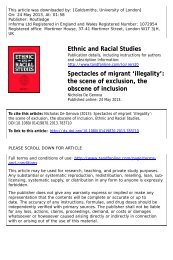migrant “illegality” and deportability in everyday life - Nicholas De ...
migrant “illegality” and deportability in everyday life - Nicholas De ...
migrant “illegality” and deportability in everyday life - Nicholas De ...
Create successful ePaper yourself
Turn your PDF publications into a flip-book with our unique Google optimized e-Paper software.
Annu. Rev. Anthropol. 2002.31:419-447. Downloaded from arjournals.annualreviews.org<br />
by Columbia University on 03/02/09. For personal use only.<br />
MIGRANT “ILLEGALITY” AND DEPORTABILITY 423<br />
reality of <strong>everyday</strong> <strong>life</strong> for those <strong>migrant</strong>s. Furthermore, by constitut<strong>in</strong>g undocumented<br />
<strong>migrant</strong>s (the people) as an epistemological <strong>and</strong> ethnographic “object”<br />
of study, social scientists, however unwitt<strong>in</strong>gly, become agents <strong>in</strong> an aspect of the<br />
<strong>everyday</strong> production of those <strong>migrant</strong>s’ <strong>“illegality”</strong>—<strong>in</strong> effect, accomplices to the<br />
discursive power of immigration law. In her ethnography of Sanctuary Movement<br />
activists’ struggles on behalf of secur<strong>in</strong>g refugee status <strong>and</strong> political asylum for<br />
undocumented Central Americans, Cout<strong>in</strong> (1993) emphasizes the <strong>everyday</strong> social<br />
relations that help to susta<strong>in</strong> what she calls “alienation” (the process through which<br />
<strong>in</strong>dividuals come to be def<strong>in</strong>ed as “illegal aliens”). “Given the pervasiveness of this<br />
system,” Cout<strong>in</strong> (1993, p. 89) contends, “any act that constructs <strong>in</strong>dividuals’ legal<br />
identities has political implications.” Notably, <strong>in</strong> her ethnography of Salvadoran<br />
legalization struggles, Cout<strong>in</strong> is explicit <strong>in</strong> her characterization of the research as<br />
“an ethnography of a legal process rather than of a particular group” (2000, p. 23).<br />
There is a need for such research on <strong>“illegality”</strong> qua sociopolitical condition, <strong>in</strong><br />
contradist<strong>in</strong>ction to research on undocumented <strong>migrant</strong>s qua “illegal aliens.”<br />
A premier challenge, therefore, is to del<strong>in</strong>eate the historical specificity of contemporary<br />
migrations as they have come to be located <strong>in</strong> the legal (political)<br />
economies of particular nation-states. Only by reflect<strong>in</strong>g on the effects of sociolegal,<br />
historical contexts on research does it become possible to elaborate a critical<br />
anthropological perspective that is not complicit with the naturalization of <strong>migrant</strong><br />
“illegality.” It thus becomes possible for the ethnographic study of undocumented<br />
migrations to produce <strong>migrant</strong> <strong>“illegality”</strong> as the k<strong>in</strong>d of ethnographic object that<br />
can serve the ends of a dist<strong>in</strong>ctly anthropological critique of nation-states <strong>and</strong> their<br />
immigration policies, as well as of the broader politics of nationalism, nativism,<br />
<strong>and</strong> citizenship.<br />
What at first appeared to be a merely term<strong>in</strong>ological matter, then, upon more<br />
careful consideration, is revealed to be a central epistemological <strong>and</strong> conceptual<br />
problem, with significant methodological ramifications, ethical implications, <strong>and</strong><br />
political repercussions.<br />
THE STUDY OF MIGRANT “ILLEGALITY”<br />
AS A THEORETICAL PROBLEM<br />
Undocumented migrations are, as I have already suggested, preem<strong>in</strong>ently labor<br />
migrations, orig<strong>in</strong>at<strong>in</strong>g <strong>in</strong> the uniquely restless creative capacity <strong>and</strong> productive<br />
power of people. The undocumented character of such movements draws our<br />
critical scrut<strong>in</strong>y to regimes of immigration law <strong>and</strong> so dem<strong>and</strong>s an analytic account<br />
of the law as such, which is itself apprehensible only through a theory of the state.<br />
Likewise, the specific character of these movements as labor migrations with<strong>in</strong><br />
a global capitalist economy dem<strong>and</strong>s an analysis of the mobility of labor, which<br />
itself is only underst<strong>and</strong>able through a critical theoretical consideration of labor<br />
<strong>and</strong> capital as mutually constitut<strong>in</strong>g poles of a s<strong>in</strong>gle, albeit contradictory, social<br />
relation.





